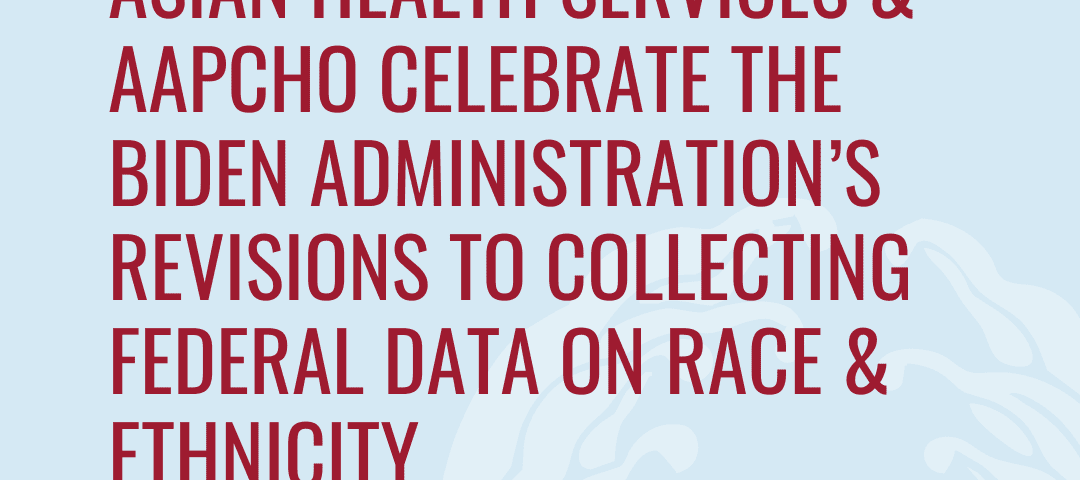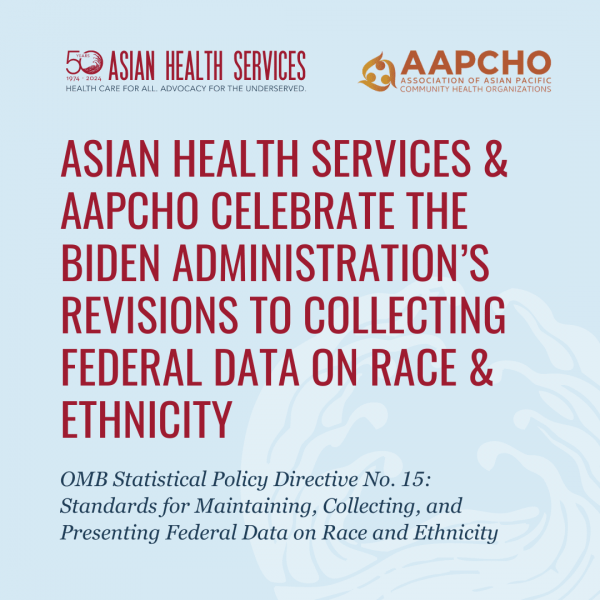
AHS & AAPCHO CELEBRATE THE BIDEN ADMINISTRATION’S REVISIONS TO COLLECTING FEDERAL DATA ON RACE AND ETHNICITY

Asian Health Services is celebrating a historic moment as the Biden administration recently announced revisions to federal standards on collecting and reporting of race and ethnicity across all federal agencies. Asian Health Services, along with our coalition leaders at the Association of Asian Pacific Community Health Organizations (AAPCHO) would like to recognize that through this hard-fought historic milestone, we are able to lift up and address the needs of the diverse communities we serve. To learn more about this historic milestone, see AAPCHO’s press release below:
==========
AAPCHO Applauds the Biden Administration’s Revisions to Collecting Federal Data on Race and Ethnicity
WASHINGTON, March 29, 2024 — The Association of Asian Pacific Community Health Organizations (AAPCHO) today released the following statement on the Office of Management and Budget’s revisions to federal standards on collecting and reporting of race and ethnicity across all federal government agencies. The updates to OMB Statistical Policy Directive No. 15: Standards for Maintaining, Collecting, and Presenting Federal Data on Race and Ethnicity mark an important milestone to improving the nation’s understanding of the needs of diverse communities, including Asian Americans (AAs), Native Hawaiians, and Pacific Islanders (NH/PIs).
Importantly, the revised standards require federal agencies to collect detailed race and ethnicity information, unless they receive an exemption from OMB’s Office of Information and Regulatory Affairs. Federal agencies will be required to collect detailed data on Chinese, Asian Indian, Filipino, Vietnamese, Korean, Japanese, and other Asian groups at a minimum; similarly federal agencies will be required to collect detailed data on Native Hawaiian, Samoan, Chamorro, Tongan, Fijian, Marshallese, and other NH/PI groups at a minimum.
The revised standards are effective March 29, 2024. OIRA requires federal agencies to establish an implementation plan within 18 months of this date. AAPCHO is committed to ensuring that agencies have robust implementation that includes public and stakeholder input. OMB also established an Interagency Committee on Race and Ethnicity Statistical Standards within OMB responsible for reviews of the standards at least every ten years with public input.
“OMB’s revision to federal race and ethnicity data standards is a once in a generation accomplishment that will lead to better and more complete information for communities within the Asian American, Native Hawaiian, and Pacific Islander umbrellas. AAPCHO has long been a champion for disaggregating race and ethnicity data to better understand our communities’ needs and direct resources where they are needed most,” said Jeffrey B. Caballero, MPH, executive director of AAPCHO. “AAPCHO recognizes the many advocacy groups who pushed for action across multiple administrations over the last 27 years, and we applaud the Biden administration for its leadership in getting it done. While it’s impossible to include every population category in the guidelines, OMB’s updates provide an important foundation for our communities. AAPCHO is also committed to working with the agencies—as well as the states and territories—to collect and report data beyond the revised standards. We look forward to the agencies fully implementing them as soon as possible.”
Thu Quach, PhD, AAPCHO board president and president of Asian Health Services, a federally qualified health center in Alameda County, California, said, “Race and ethnicity are important factors to understanding patients’ risk factors for disease, their patient experience in the complex health care system, and how providers can provide compassionate and effective care. Asian Health Services and many community health centers already collect detailed race and ethnicity data, and we have demonstrated time and again how this information is key to providing culturally responsive care that yields better patient outcomes, as well as help us identify hidden disparities that require targeted intervention for some groups. We appreciate OMB updating these federal standards and providing a floor for agencies to collect more detailed information on our communities. We hope federal, state, and local governments will implement them in ways that meet the true needs of communities.”
————————
About Asian Health Services
Asian Health Services (AHS) is a community health center that provides medical, dental and behavioral health services in 14 different languages to medically-underserved families throughout Alameda County and surrounding communities. As a nationally recognized community health center model, AHS stands at the forefront of quality and innovation. We address the unique cultural beliefs, language needs, attitudes and values of our patients. We provide healthcare for all and advocacy for the underserved. https://asianhealthservices.org/
Contact Daphne Wu at communications@ahschc.org.
About AAPCHO
AAPCHO is a national association of community health organizations dedicated to promoting advocacy, collaboration and leadership that improves the health status and access of Asian Americans, Native Hawaiians, and Pacific Islanders in the United States, the U.S. territories, and Freely Associated States. For more information on AAPCHO, please visit www.aapcho.org.
Contact Kristine Cecile Alarcon, MPH, (510) 671-5054, kalarcon@aapcho.org
# # #
